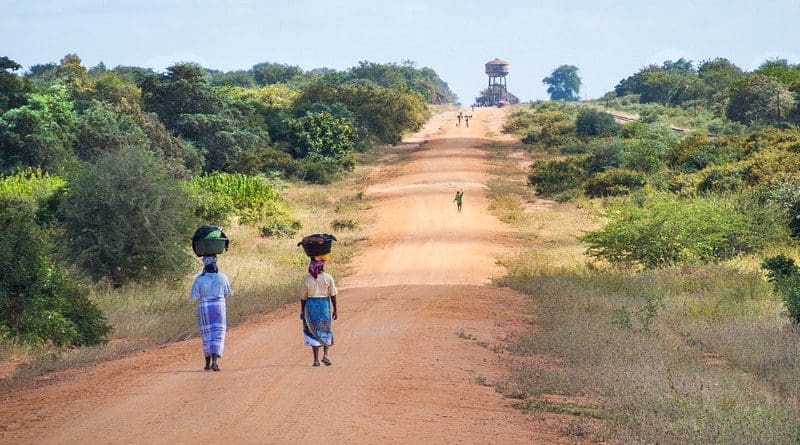Mozambique: Hundreds Of Women, Girls Abducted
An armed group linked to the Islamic State (ISIS) has since 2018 kidnapped and enslaved more than 600 women and girls in Mozambique’s northern Cabo Delgado province, Human Rights Watch said Tuesday. Mozambican and regional forces have rescued some of them, but many remain missing.
The group, known locally as Al Sunnah wa Jama’ah (ASWJ) and Al-Shabab (or mashababos) forced younger, healthy-looking, and lighter-skinned women and girls in their custody to “marry” their fighters, who enslave and sexually abuse them. Others have been sold to foreign fighters for between 40,000 and 120,000 Meticais (US$600 to US$1,800). Abducted foreign women and girls, in particular, have been released after their families paid ransom.
“Al Shabab’s leaders should immediately release every woman and girl in their captivity,” said Mausi Segun, Africa director at Human Rights Watch. “They should take all necessary steps to prevent rape and sexual abuse by their fighters, end child marriage, forced marriage, and the sale and enslavement of women and girls at their bases and areas of operation.”
Between August 2019 and October 2021, Human Rights Watch remotely interviewed 37 people, including former abductees, their relatives, security sources, and government officials, and monitored media reports about kidnappings. They said that Al-Shabab abducted women and girls during attacks in various Cabo Delgado districts, including Mocímboa da Praia in March, June, and August 2020, and Palma in March 2021.
A 33-year-old woman said that Al-Shabab fighters assaulted her aunt, a local official, and forced her at gunpoint to identify all the houses containing girls between ages 12 and 17 in Diaca town, Mocimboa da Praia. The woman counted 203 girls but did not know whether the fighters abducted all the girls. “Some mothers were begging the fighters to take them instead of their daughters,” a 27-year-old man said. “But one of the mashababos said they didn’t want old women with children and diseases.”
A 34-year-old former abductee from Mocimboa da Praia said he was forced to select the women and girls for sex with the fighters on their return from military operations. “Those [women] who refused were punished with beatings, and no food for days.”
On April 30, the African Union Commission’s special envoy on women, peace, and security, Bineta Diop, called on the Mozambique government, regional bodies, and the international community to “act swiftly and provide adequate support” to women and girls who had been held and mistreated by Al-Shabab.
In recent years, the Mozambican authorities have made some progress rescuing hundreds of kidnap victims from the group’s bases. However, the authorities have kept those liberated incommunicado for weeks or longer without access to relatives, ostensibly for security screenings.
In October, an official in the Cabo Delgado governor’s office told Human Rights Watch that the army was holding hundreds of people, mostly women and children, freed from the group’s bases in the Complexo Desportivo de Pemba (Pemba Sports Complex). The soldiers were holding them to separate civilians from suspected fighters. The official said that those held in the facility were receiving medical attention, including psychosocial (mental health) support, but did not specify the nature of the help or who was providing it.
Mozambican authorities and international and regional partners, including the Southern African Development Community (SADC), should provide rights-respecting, gender-sensitive, child-sensitive, and dignified reintegration and rehabilitation services, including comprehensive post-rape care, to rescued women and girls, Human Rights Watch said. The authorities should fully investigate and appropriately prosecute Al-Shabab leaders and fighters for abductions, child and forced marriages, rape and sexual violence, enslavement, and other gender-based crimes in violation of international and Mozambican law.
Al-Shabab’s abuses against women and girls also contravene regional and international human rights law and violate international humanitarian law. Specialized international and regional treaties on women’s and children’s rights, including the Protocol to the African Charter on Human and Peoples’ Rights on the Rights of Women in Africa (the Maputo Protocol), ensure the right to be free from sexual and gender-based violence, including reproductive violence. Under these instruments, the Mozambique government has obligations to prevent, investigate, prosecute, and punish those responsible for abuses as well as provide timely, accessible, and effective remedies to victims and survivors.
“An unknown number of women and girls remain in captivity in Mozambique, facing horrific abuses daily, including enslavement and rape by Al-Shabab fighters,” Segun said. “Mozambican authorities should intensify efforts to rescue and reintegrate survivors into their communities, and promptly ensure their humane treatment and access to medical and psychosocial services.”

